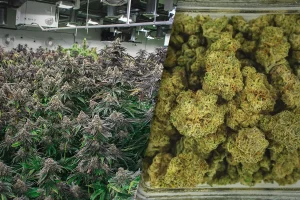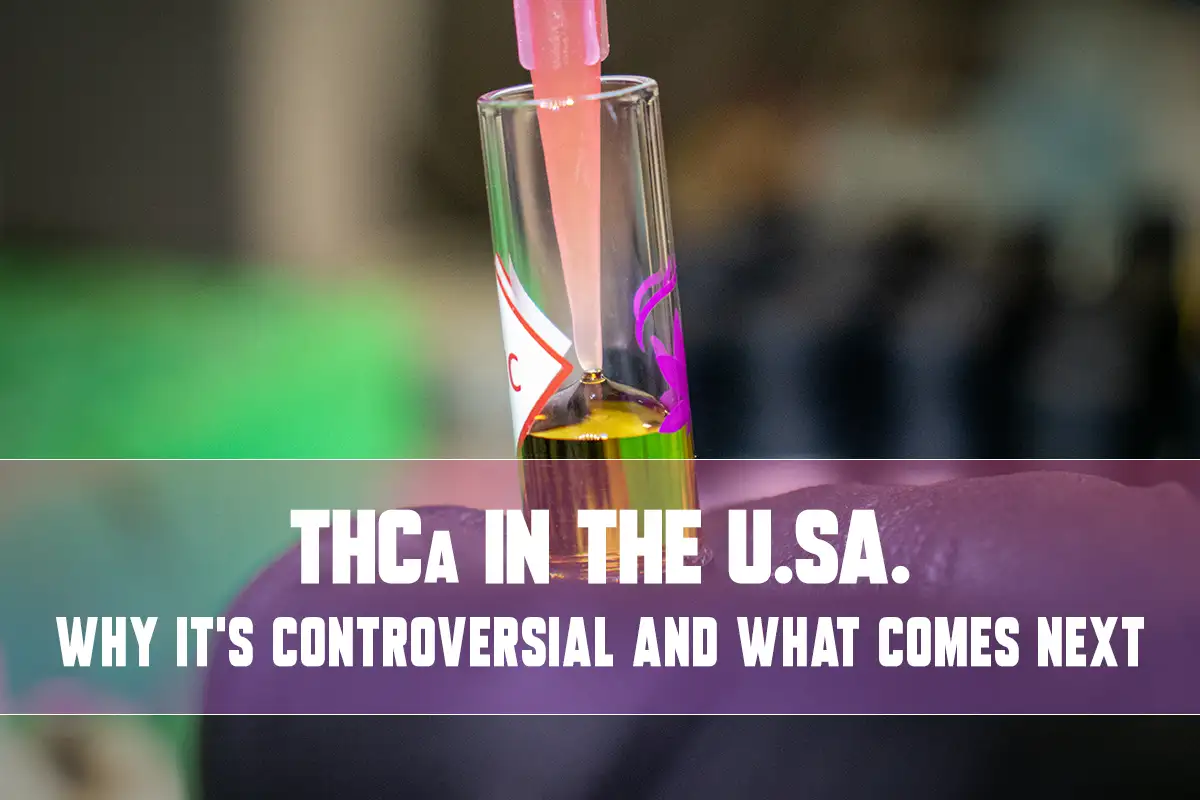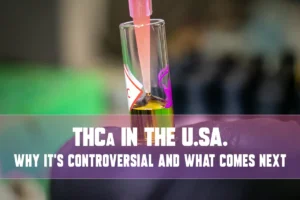Is THCA legal? Explore the fast-evolving U.S. debate over hemp-derived THCA, including industry divide, consumer safety, regulations, economics, and outlook
.
What is THCA, and why the uproar?
Tetrahydrocannabinolic acid (THCA) is a non-intoxicating cannabinoid found in raw cannabis. When heated (smoked, vaped, baked), THCA decarboxylates into delta-9 THC, the federally controlled psychoactive compound. That scientific twist sits at the heart of today’s policy fight: the 2018 Farm Bill legalized hemp with less than 0.3% delta-9 THC by dry weight, but didn’t explicitly ban high-THCA products that convert to THC when used, creating what many call the “hemp loophole.”
The Industry Divide
Hemp operators argue that selling “compliant” hemp (low delta-9 before use) is lawful under the Farm Bill and USDA cultivation rules, which measure total THC (Δ9 + 0.877×THCA) before harvest, not in finished goods. They say post-harvest retail products shouldn’t be held to cultivation testing standards.
State-licensed marijuana businesses counter that high-THCA hemp flower competes with taxed, tested dispensary products without meeting the same licensing and safety requirements, pressuring margins and confusing consumers. Attorneys general and regulators in several states have moved to restrict or ban intoxicating hemp products, including THCA flower.
Federal agencies are also split in emphasis:
- DEA has clarified that THCA counts toward the THC limit because it becomes delta-9 when heated.
- USDA focuses on hemp production (pre-harvest testing and disposal for crops >0.3% total THC).
- FDA continues warning-letter enforcement against unsafe/illegally marketed cannabinoid products and is moving to track adverse events for hemp-derived cannabinoids more systematically.
Regulatory Push: Where the Law Is Heading
- Congressional proposals. House appropriators advanced language in 2025 to redefine hemp so the 0.3% cap applies to total THC (including THCA and isomers), which would effectively remove most intoxicating hemp products, including high-THCA flower from the market if enacted. Related analyses from law firms highlight how this would “close the loophole.”
- State actions. A growing list of states is tightening rules or banning THCA flower and intoxicating hemp; courts in some jurisdictions have upheld restrictions or redirected sales into licensed dispensaries. Tennessee enacted a phased ban beginning in 2026; an Arizona court allowed restrictions to proceed under dispensary frameworks.
Consumer Impact
Access & price. Intoxicating hemp products (including high-THCA flower) often sell outside dispensaries, sometimes at lower prices and with wider online availability. Looming federal/state changes could shift these products behind dispensary counters or off shelves entirely, affecting availability and cost.
Clarity & risk. Consumers face label confusion: “hemp” products can become intoxicating when heated, yet may appear compliant on paper (pre-use delta-9 <0.3%). Inconsistent testing and age-gate rules increase the risk of accidental intoxication or youth access. The FDA has issued repeated warning letters against mislabeling and unsafe formulations.
Consumer Safety & Education Measures
- Age restrictions & retail controls 21+ for intoxicating products; no vending or gas-station self-checkout
- Uniform product testing of finished goods for total THC, contaminants (heavy metals, residual solvents, pesticides), and accurate potency labeling.
- Clear front-panel warnings that THCA converts to THC when heated; dosage guidance; delayed-onset cautions for edibles.
- Adverse-event reporting and recall readiness are aligned with the FDA’s push to capture cannabinoid-related events.
- Youth marketing prohibitions: No child-appealing packaging, cartoon branding, or copycat snacks.
Legal & Regulatory Analysis
Current federal baseline.
- Hemp becomes “cannabis” with delta-9 THC (dry weight) testing greater than 0.3%. USDA enforces pre-harvest total THC testing for growers; non-compliant crops must be destroyed.
- DEA guidance treats THCA as part of THC for legal purposes due to decarboxylation. This position is increasingly reflected in proposed federal language.
- The FDA does not recognize THC/CBD as dietary supplements and continues targeted enforcement.
State patchwork.
- Some states allow regulated intoxicating hemp with testing and age gates; others restrict or ban THCA flower and require sales through dispensaries. Expect more cease-and-desist actions and AG-led enforcement where hemp products mimic state-licensed marijuana.
Pros & cons of the status quo
- Pros: Keeps federal hemp definition simple; supports a national hemp supply chain; fosters innovation; preserves access where marijuana remains illegal.
- Cons: Incentivizes “workarounds” (high-THCA “hemp” that becomes intoxicating), uneven safety standards, market confusion, and friction with state marijuana systems.
Pros & cons of total-THC proposals
- Pros: Aligns legal definitions with real-world intoxication; simplifies enforcement; channels sales into licensed, tested dispensary systems; improves consumer clarity.
- Cons: Potentially wipes out large segments of the hemp-derived market and jobs, reduces access in prohibition states, and could spur illicit sales if not paired with workable pathways for compliant products.
Economic Stakes
- The U.S. market for intoxicating hemp-derived cannabinoids (e.g., delta-8, delta-10, THCA products) grew to ~$2.8B in 2023, per Brightfield Group data reported by Cannabis Business Times. A nationwide rollback or dispensary-only shift would significantly reallocate this spend.
- A national analysis estimates $79B+ in total economic impact from hemp-derived cannabinoids (demand, jobs, wages, indirect effects). State-level reports (e.g., Texas) show billions in activity and tens of thousands of jobs at risk under broad bans.
- On the flip side, licensed marijuana sectors argue that tightening rules would stabilize margins and tax receipts by curbing unregulated competition. Arizona’s ruling and Missouri’s AG actions reflect this pressure.
Industry Perspectives
Hemp brands & retailers
- Pros: Broader interstate commerce, lower compliance costs than dispensaries, product innovation runway.
- Cons: Legal uncertainty, seizures/misinterpretations, shifting state bans, payment/advertising friction.
Licensed marijuana operators
- Pros: “Close the loophole” reduces gray-market competition; clearer guardrails; improved tax capture.
- Cons: Too-broad bans could also hit legitimate hemp inputs; transition pains if supply chains rely on hemp cannabinoids.
Testing labs & compliance firms
- Pros: Higher demand for validated finished-goods testing and age-restricted compliance frameworks.
- Cons: Need for standardization; managing different state methods and uncertainty margins.
Consumers
- Pros: Access where marijuana is illegal; price competition; diverse product forms.
- Cons: Label confusion; variable quality; uneven age gates; potential for unsafe or mislabeled products.
Practical Compliance & Education Checklist
- Test finished products for total THC and contaminants; publish COAs with batch numbers and uncertainty ranges.
- Age-gate 21+ for intoxicating products; require ID; avoid youth-appealing packaging.
- Use plain-English labels: “THCa converts to THC when heated; may be intoxicating.”
- Establish complaint handling and adverse-event reporting procedures; monitor FDA actions.
- Track state law changes weekly; courts and AGs are active
Future Outlook
- Federal reset likely. Congressional vehicles (appropriations/Farm Bill follow-ons) are poised to tighten the hemp definition to total THC, sweeping THCA into the cap. If enacted, expect a rapid migration of intoxicating hemp into licensed marijuana channels or a sharp contraction where those channels don’t exist.
- State convergence. Even before federal action, states are moving toward age limits, testing, and either dispensary-only sales or outright bans for intoxicating hemp; more AG-led enforcement is probable.
- Safety infrastructure. FDA’s adverse-event tracking and continued warning letters will pressure manufacturers toward pharmaceutical-style QA/QC, clearer labels, and responsible marketing.
- Market reshaping, not vanishing. Demand won’t disappear; it will reallocate either into regulated dispensaries or, absent workable rules, into illicit markets. Clear, consistent, enforceable standards are the difference between consumer safety and chaos.
Quick FAQ
Is THCA legal federally?
Hemp is federally legal if it contains less than 0.3% delta-9 THC (dry weight). DEA guidance treats THCA as part of THC because it becomes intoxicating when heated, and Congress is considering language to make the total THC cap explicit. State laws may be stricter.
Why are some states seizing THCA flower?
Officials say it is effectively marijuana in practice and must be sold through licensed dispensaries or not at all. Courts have allowed restrictions in some states, and AGs have issued cease-and-desist notices.
What should consumers look for?
Age-restricted sales (21+), batch COAs on finished goods, total-THC potency disclosure, contaminant testing, and clear warnings that THCA converts to THC when heated.











